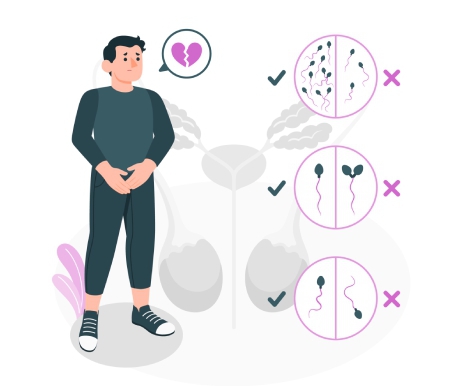
Sperm abnormalities, a common cause of male infertility, refer to irregularities in the shape, size, or movement of sperm. These abnormalities can affect a man’s ability to conceive a child naturally. This article explores the causes, types, diagnosis, and potential treatments for sperm abnormalities, shedding light on an issue that is often under-discussed but crucial for reproductive health.
What Are Sperm Abnormalities?
Sperm abnormalities are irregularities in the structure (morphology), movement (motility), or number of sperm in a semen sample. For conception to occur, sperm must be healthy, have a normal shape, and move efficiently to fertilize an egg. When abnormalities are present, fertility issues may arise.
Types of Sperm Abnormalities
A. Morphological Abnormalities
Morphology refers to the size and shape of sperm. Normal sperm have an oval head and a long tail. Abnormalities may include:
Misshapen heads
Double tails
Short or crooked tails
B. Motility Abnormalities
Sperm motility measures how well sperm move. Poor motility (asthenozoospermia) can hinder the sperm’s journey to the egg. Motility issues may involve:
Immobile sperm
Slow or erratic movement
C. Numerical Abnormalities
Oligospermia: Low sperm count (fewer than 15 million sperm per milliliter of semen).
Azoospermia: Complete absence of sperm in the semen.
D. Genetic Abnormalities
Defects in the sperm’s DNA can impact fertilization and embryonic development, leading to infertility or miscarriage.
Causes of Sperm Abnormalities
Several factors can contribute to sperm abnormalities, including:
Lifestyle Factors: Smoking, excessive alcohol consumption, drug use, and obesity.
Medical Conditions: Varicocele (enlarged veins in the scrotum), hormonal imbalances, infections (e.g., STIs), and diabetes.
Environmental Factors: Exposure to radiation, pesticides, and industrial chemicals.
Genetic Factors: Chromosomal abnormalities or mutations.
Age: Male fertility declines with age, leading to a higher chance of abnormalities.
Diagnosing Sperm Abnormalities
A semen analysis is the primary diagnostic tool used to evaluate sperm health. The test examines:
Concentration: Number of sperm in the semen.
Motility: Percentage of moving sperm.
Morphology: Percentage of normally shaped sperm.
In cases of severe abnormalities, additional tests, such as genetic screening or hormone analysis, may be necessary.
Treatment Options
Treatment for sperm abnormalities depends on the underlying cause:
- Lifestyle Modifications: Quitting smoking, reducing alcohol intake, maintaining a healthy weight, and managing stress can improve sperm health.
- Medications: Antibiotics for infections, hormone therapy for imbalances, or antioxidants to reduce oxidative stress.
- Surgical Intervention: Procedures like varicocele repair can improve sperm quality.
- Assisted Reproductive Technologies (ART):
Intrauterine Insemination (IUI): Sperm are directly inserted into the uterus.
In Vitro Fertilization (IVF): Sperm and egg are combined in a lab, and the resulting embryo is implanted in the uterus.
Intracytoplasmic Sperm Injection (ICSI): A single sperm is injected directly into an egg, bypassing motility or morphological issues.
Prevention and Prognosis
While not all sperm abnormalities can be prevented, adopting a healthy lifestyle and avoiding harmful substances can reduce risks. Early diagnosis and tailored treatment plans significantly improve the chances of successful conception.
Sperm abnormalities, though a challenging aspect of male infertility, are manageable with modern medical interventions. Understanding the types, causes, and treatments can empower individuals and couples to seek appropriate care and make informed decisions. If you suspect fertility issues, consulting a healthcare professional is the first step toward achieving your reproductive goals.
…….…………… Adelekan Oluwaseun Ojo, is a counseling psychologist, and a business & health consultant with Jigsimur Zdex Int’l, a company which is into the production and distribution of Jigsimur herbal health drink, a natural curative and preventive herbal medicine from South Africa.
For personal consultation, you can contact us on 07089225319 or 08035122399





